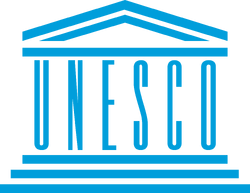UNESCO - basic data
| |
 |
|
UNESCO - United Nations Educational, Scientific and Cultural Organization was founded on November 16, 1945, at an international conference in London as a response to two devastating world wars, when the international community realized that economic and political agreements were not enough to maintain lasting peace - people needed to be led to moral and intellectual solidarity and mutual understanding. |
Czechoslovakia was one of the 37 founding states of UNESCO. After its division into two independent states, Slovakia became a full member of the organization on February 9, 1993. Today, this important international organization has 194 member states and 11 associate members without voting rights (Anguilla, Aruba, British Virgin Islands, Curaçao, Faroe Islands, Cayman Islands, Macao, Montserrat, New Caledonia, Saint Martin and Tokelau).
UNESCO provides a space for intercultural dialogue, through which countries jointly find solutions to current challenges. It is the only specialized agency of the United Nations (UN) system with a mandate to develop the cultural and intellectual potential of the world community and is based in Paris.
UNESCO focuses on 5 main sectors:
-
Education:
- Primary education for all, with special emphasis on literacy, HIV/AIDS prevention education and teacher training in sub-Saharan Africa
- Secondary education, including technical and vocational education
- Promoting quality education, with an emphasis on values education and teacher training
- Higher education
-
Natural sciences:
- Water and related ecosystems
- Oceans
- Capacity building in basic and engineering sciences, formulation of scientific policies and promotion of a culture of management
- Promotion of the use of science, engineering and technology appropriate for sustainable development, use and management of natural resources, renewable energy sources, disaster preparedness
-
Social and humaines sciences:
- Ethics in science and technology, with emphasis on bioethics
- Promoting human rights in the fight against all forms of discrimination, racism, xenophobia and related intolerance through activities within the competence of UNESCO
- Foresight, philosophy, humanities, democracy and security enhancement
- Managing social transformation
-
Culture:
- Promoting cultural diversity, with special emphasis on tangible and intangible heritage
- Cultural policies as well as intercultural dialogue and understanding between different religious faiths
- Cultural industries and artistic creation
-
Communication and information
- Empowering people through access to information and knowledge with special emphasis on freedom of expression
- Supporting the development of communication
- Increasing the use of ICT in education, science and culture
You can find out more about the establishment of the international organization UNESCO on these pages: www.unesco.sk a www.unesco.org
Last update: Updated 30.07.2025 13:37 Print Page Up



